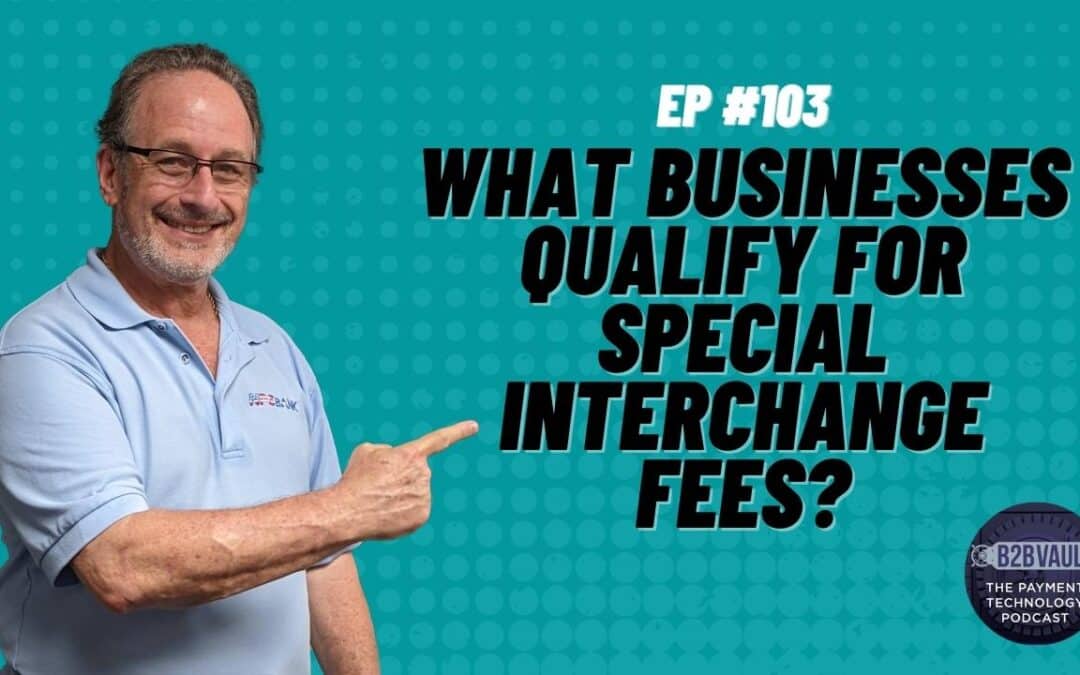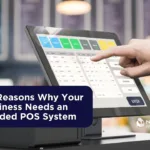

VIDEO TRANSCRIPTION
Yo! What’s up, everybody? It’s Justin Live from B2B Vault, the payment technology podcast with your host, Allen Kopelman! And we’ll be providing you with educational information about business payments, FinTech, decentralized finance, and the technology businesses use in today’s world. And in today’s podcast, we’ll be discussing what businesses qualify for special interchange fees.
I know that’s a lot to swallow, there are a lot of different businesses that qualify for these rates that they don’t know about. And you could be saving tons of money every month. And Allen and I thought that it’d be a good idea to try to enlighten these business types on these opportunities that are out there.
Yeah, right? Yeah. Visa, MasterCard, like when they do the interchange tables. Before you, what is interchange? So, the interchange is the cost that the banks that issue the cards collected from the merchant. All right. The merchants, all merchants. Dumb it down even further. All merchants pay interchange fees.
We make no money from the interchange. What? So, the interchange fee is when I slide my I’m the customer, I slide my card, the per they get their money. Then the credit card company, there’s fee the merchant. Right, let’s say the merchant pays 2%. Then there’s an interchange fee in there.
You’re going way ahead of them. I know. The merchant pays2% of? No that would say their rate is 2% so they’re paying. Of what? The sale! So, let’s say it’s a hundred dollars sale. Their overall rate is let’s say 2% or 2+ 1/2%. So, they pay $2 and 50 cents for that. On the hundred dollars that they collected. Right!
They’re paying that to the credit, the processor. Which could be? Us! Or? Any other credit card processor, First Data, Tsys, Global. Authorize? No Authorize is not a processor! Oh, that’s right, never mind. Whoever’s their processor collects that fee. And then out of that fee comes the interchange makes up almost 90% of what you pay for.
So, you’re paying interchange, dues assessments, which go to Visa or MasterCard, American Express, or Discover. But the interchange goes back to the card issuer. So, if it’s a Chase card, they’re the ones who’re collecting the lying share of everything. So, you’re a business, you set up your merchant account with Chase bank.
Is what you’re saying? You could set it up with them. Right, and you’re saying it just. But I’m saying that when someone comes and gives a card to you, whoever’s name is on the card. They’re the ones collecting the interchange. No matter what bank it is. If you come in with a Bank of America. Oh, the client’s card?
Yeah, the client’s card, that bank is collecting the interchange. It’s very complicated. It’s to most. Yeah, it’s complicated! It took me a long time to understand like all the different interchange, blah, blah, blah, blah. So, the interchange charts are pages and pages, 70 to 80 pages long. But they single out certain types of business in there, like airlines that have a certain interchange. What do you mean by single out? They single out certain business types. To do what? They give them a special interchange fee.
Ah! That might be lower than normal. Like retail interchange fee that you had if it’s Justin’s t-shirt shop. Or J Sam shop? Right! So, they give you a lower, even for restaurants have special interchange. That’s a little bit lower than retail. Why do they do that? Because they want, because Visa, MasterCard, those were probably, those are industries that they struggled with years ago.
So that’s how they set up the infrastructure. Personally. I think it’s way too complicated, but certain businesses can save a ton of money if they’re smart and they go to the, go to somebody like me, who understands this system. So, I’ll give you some examples of businesses where they can save tons of money, like insurance.
Okay. Insurance companies? Yes. An actual, not the agent, but the actual insurance company. Like National General? An insurance company, or let’s say someone is a third-party administrator. Where a third-party administrator collects payments on behalf of insurance companies. So, they, maybe the smaller insurance companies don’t have so many customer service staffs to deal with that.
So, they use these third-party administrators to administrate their policies. That’s where I signed up for my first card, sounds like the shady stuff that I was having to deal with. So like insurance, they get a special interchange rate. It’s less than 1%. Wow. Their interchange, sometimes, like I’ve reviewed different insurance companies and then they’ll be paying, really high rate.
And they don’t understand that they could be paying a lower interchange rate, but as the underwriters will say, hey, not every insurance company is the same because they don’t want to take, let’s say you have an insurance company. They don’t have a good rating; they’re not going to get the best rates from the credit card company.
Got it! Because insurance companies are all rated. Right. But if they have a good rating, then they should be able to get good rates. Another one is fuel dealers, right? So, where this comes into play is, that there’s a different rate. If it’s a gas station with pay at the pump and pay inside. But there are also other types of fuel dealers.
There are guys that drive around in trucks, and they go fill up boats or they’re selling propane. They can also be a fuel dealer. So, like natural gas and stuff like that? Yeah, so we’ve signed up companies and they’re just paying retail interchange and they’re not getting the fuel rate.
Oh, really? Yeah, they’re not signed up under the correct. Why would that happen? Would that be like the? They went to their bank and their bank just set them up as retail. Cause they don’t know? They don’t know the banker doesn’t know. Or could the banker be a little shady because they know they’re going to get more? No, because it doesn’t matter to them.
They’re not going to if they don’t use the correct SIC code. Then they’re not going to get the correct interchange fee. That’s my point. But they’re not making any extra money because they’re not paying the correct interchange fee back to the bank. So, they’re not making, there’s no extra profit there.
I get it. Or maybe they are making extra profit, but they’re not giving the merchant the savings that should have. There are all different types of businesses that we’ve looked at. One that I always see never has the right SIC codes or education. So, education includes early childcare centers, daycare centers, and all that.
And I’ve seen some of them. I’m like, wow, I don’t understand. You’re processing your credit cards through some company and you’re paying like 2% more than you need to be paying. And they don’t understand that there’s a special rate just for education. Because years ago, like they did that
so that colleges, and other types of schools, private schools can take credit cards and take more credit cards. That’s why they call them the emerging markets. Cause, these business types don’t take enough credit cards. Like insurance, I guarantee most insurance is paid by ACH or paper checks or some kind of bank transfer, not by credit card.
And because we provide both of them so we can see the level of payment. Another one that gets special rates, which I see set up wrong is subscription services. So, we were talking about that in other podcasts, a subscription economy we talked about SaaS companies. And those are companies where people are on a subscription.
If you’re set up correctly and you’re a subscription merchant, there’s a special interchange just for subscriptions. Could that be, so like for web agencies, if they’re on maintenance plans every month, does that consider a subscription? Yeah, sometimes it’s more advantageous for them to have more than one merchant account.
If they’re doing a to, it’s got to be worth it. Let’s say you’re doing 25, 50 grand a month. Okay. That’s the time you want to split up your merchant business because you’re going to save enough money doing that. If you’re not doing that much volume, that doesn’t really pay. For maintenance for like large agency
that makes sense. Because typically like you get this large lump sum from a project and then after that, it’s just a small amount. Yeah, let’s say you’re selecting a few hundred dollars a month. It’s worth it to have a separate merchant account. If you’re doing 20, 30 grand a month, 40 grand, 50 grand a month. And it’s all on subscription, just a SaaS software, like where they charge people 20 bucks to a hundred or 200 bucks a month to do all your social media posting.
They should be set up under that SaaS. Oh, for sure! But most of them. What do they do? They’re a set up on Stripe paying 3 and a half percent. They could be paying much less if they had a direct merchant account! Insane. That’s where people miss the boat by going, they go to those services and they’re not taking advantage of these lower interchange categories where they can save a ton of money.
Like during the pandemic, how those DJs were doing like the parties on Twitch and stuff like that. It could they, I know there’s a through Twitch there are subscription services, like through that company. Yeah. You probably can’t integrate into that. No, I don’t think so either, but say.
Say a DJ was doing it on his own, through his own website. That’d be a great way of doing that. Yeah. Yeah. You’d have to, another one is telecommunications because there are tons of companies who resell telecommunications. So, they resell void. And they resell internet service, and then they’re not set up correctly.
They’re using PayPal, Strip, or Square and they could be paying much less credit card processing fees with a traditional merchant account. Again, as I said, it makes sense if you’re doing 25 grand a volume, it makes sense to do that. If you’re doing less than 25 grand, it’s not worth it, it’s probably not worth the hassle.
Yeah. But it’s worth the hassle to get off PayPal, Stripe, and Square. But I’m just saying. You got to go through documentation because you got to show you have a business license that shows that you’re in these businesses! Right. Otherwise, you can get billed back. Like even grocery stores, there’s a qualification.
Oh, the grocery store has to have three checkout lanes. It has to sell fresh food. To be considered a grocery store? Yeah, fresh food, frozen food, and produce, are to be considered grocery stores. So, you can’t be a grocery store and you’re really a convenience store. Because what happens is the credit, the bank will come in.
So that’s crazy, that’s the separation. It’s got to have three lanes to check out. Right! So, as you go to New York, you go to the bodega, the reason is that it’s not a grocery store. Well, no, some of them qualify as a grocery store because they have all that stuff in there. But they don’t have three lanes! But if they have all the items then other stuff, if you have all the items, you could be a grocery store. You have to have fresh, frozen, meats. So, there’s a gray area? There’s some gray area. No, there’s some room to wiggle room. That’s there’s wiggle room. There’s wiggle room too. Some of them they’re not a real grocery store.
No, for sure. Has to be actual, they have to have it. Did you see that video, this side note, did you see the video of the sorry guys, the ass hat that he was a younger guy, he moved out to New York? He was working for a tech company. And he’s, he was starting to make TikTok’s. Cause he, he moved. I think he was in Harlem.
Don’t quote me. I’m pretty sure he moved somewhere uptown. Okay! And he was making TikTok’s, and he was trying to find a grocery store. Yeah. And he kept walking into bodegas and he’s I can’t find no, there’s no, I want to make a meal. Where do I, he was like the way he was going, it could sound, it sounded derogatory.
Do you know what I mean? And the kid ended up getting fired. Oh, that’s not good! Hey man, you got to watch your mouth New York’s real place. Bodega had been around since before I was born. And they’ve helped communities survive. You aren’t going to go in there and find a lobster tail, bro.
You’re going to go in there and find a ring, baloney, some white bread, and some craft cheese. And that’s what it is, a pack of Ramen noodles. But you can’t go in there and expect them to find some duck. No, but some of them. Come on, man. Sorry. But some of them are bigger and they actually have it. All that stuff for sure. You go in and they got like little farmer’s market action going on and salads. Yeah, I was just out in Philly, man.
You, you walked out there. They had a full butcher area, they had the deli, and they had the little aisle to get your bread. Right! And they had tons of fresh fruit and vegetables. My daughter that’s where she shops. I’m just saying that makes it a grocery store. The one thing you’re seeing now is that they’ll build an apartment building somewhere
now, this is the new thing. Stores are underneath it. And then they’re putting the Publix underneath a small Publix yeah. Or a small Trader Joe’s or Whole food or something. And I think that’s, like really necessary when they build, because. It’s a great idea. Because
I don’t think that in the past they like thought about that. And I actually see Publix. Yeah, not the food desert thing is a real thing. But I grew up in the city, and I was fortunate. I had a, a corner, a bodega on my corner. But they didn’t have lettuce, tomatoes, and fresh fruit.
No, that’s what I’m saying. Like now when you see, now. Companies are like, oh, we got to build, like I was over in one area like downtown Coral Springs, which is not far from here. They’re building like this whole, all these new apartments, and everything. And they’re putting a grocery store down on the bottom.
Yeah. It’s a no-brainer! That’s needed for it’s that neighborhood too because there’s not a, there was a grocery store in the corner and it got wrecked out from Wilma, which was a long time ago already. Wow! So that grocery store was old, and the ceiling fell in. Winn Dixie? No, it was Publix.
Oh. And then the land is vacant. So now they’re building on that and across the street and they were originally going to put offices, but then the pandemic hit. Now, there’s no demand for offices. So now they’re putting in more apartments, less offices. A grocery store. And then a grocery store at the bottom.
And I see it everywhere, like downtown Fort Lauderdale. Yeah. Like my daughter, she went to The University of Florida now, after she graduated, we had gone up there to visit and, on the corner, right across the street from the university, they put up Publix, man, let me tell you, that’s probably the busiest Publix on the planet because. Oh wow!
You have thousands of students living in the apartments, living in the dorms. Right! When I went to college there was no grocery store within walking distance. No, but I’m saying within walking distance. And, before, like my daughter wanted to go to the grocery store, she had to either take her car or take a bus or get a ride or do the rideshare car. Catch the shuttle!
No, the rideshare car. Our, my college had a shuttle bus. Right. Or they have a shuttle bus or a trolley that takes people to the grocery store, it’s a real pain. And the grocery store, several miles from the university. Now. That’s not fun waiting for the shuttle. And I see even like downtown Fort Lauderdale, they’re like, they’re building all these apartments and then they slap it.
Get putting a grocery store. This way people can get it, they don’t have to drive 10 minutes to the grocery store. They just get out of their apartment and walk across the street. Not only that, just imagine all the poor people who can’t even drive. Like there, my grandmother was one of those people. She, we had to catch the taxi too, to go grocery shopping, like forever, like that’s what I mean, my grandpa couldn’t drive anymore. We would have if there was no walk to the grocery store. Even where my mom lives on Hollywood beach. There are condo buildings everywhere. Every time my mom wants to go to the grocery store just to get in her car, go across over to the other side of the bridge and go to the grocery store.
Now they’re going to put one on the beach side, on her side. Yeah. And that’s awesome. Now my mom can, she’s 87, she’s not walking to the grocery store, but let’s just say you live. In theory, she could. In theory, you could get one of those carts. Yeah. Get her little scooter bro, or no, but I’m just saying, in theory, you could just have a small cart. That you take with you, you go to the grocery store, get what you need, and now you don’t have to do this whole drive over the bridge. That could take 30, or 40 minutes if there’s a ton of traffic. Yeah. I think the people around the United States of America.
Good job for speaking up about, the food deserts everywhere, because yeah, that’s a real thing, man. No, it’s just making it more convenient, when they’re building these, when they’re built, when you know the, and I think a lot of it comes from the city. Saying, hey, you, if you’re going to build a giant, a bunch, you’re going to build a few thousand apartments.
You need to put a grocery store on your property. And it’s part. And it’s you need a school and to pay for school too. You would think that they would start incorporating some sort of school system, educational building inside of there. I’m not talking about like a daycare center.
There is a lot of those I’ve been seeing, like even. No, but I’m saying like when they build all these like huge housing communities, they make, I know like out where I lived way out west. So, when I first moved that west and they started building the, they went to the builder like whoa.
You’re going to build all these houses. You’re going to build like 2000 houses. Guess what? You got to build a middle school and a middle school and an elementary school. And then add onto the high school. They made them do it, the builder, how to find, put, build them for the county. But what was the reasoning?
Because they’re going to put all these houses where what the county. Oh, are they going to go to school? Okay. Where are they going to go to school? You’re already building the houses, just build the school with it. It makes a lot of sense to me. So that was part of the deal you want to build. And I think that they have to look at that when you’re building communities out, that they need to put the shopping so that people have convenient shopping.
You’re not living way out. My daughter lives in Iowa. It’s a whole different setup over there, it’s you got to drive far to go to the store, but people are living on bigger pieces of property and stuff like that. As people start, as they start to do more things in like in downtown areas build more and more apartments, like even in downtown Fort Lauderdale, like glass, they built all these high rises and there’s no store there’s no Publix.
It’s ridiculous. They should have built a; they should have put a grocery store there. Yeah, they should have. I hope that one day that one of those, some restaurant goes out of business or something, and the grocery can go in there and put a grocery, but you got all these huge high rises. I don’t know how many there are 20 or 30 of them.
In one area. There’s no grocery store there. You have to go farther away where they built more high rises now and they put a grocery store over. But I’m just saying we, they need to make things more convenient. Yeah. But the emerging markets like utilities, there are all types of utilities out there that are considered utilities, even dumpsters.
We do credit card processing for a dumpster company. Nice! And put the dumpsters behind businesses. They charge them monthly. Sanitization? Yeah, sanitization. And even others like small, there are lots of small utility companies, but they’re not getting the correct things. And even government entities have to get set up under the correct SIC codes.
Many of these people I talk to, they’re like, oh, we’re with Stripe. I’m like, why are you paying so much paying three and a half percent to process a credit card? You could be paying two and a half percent. Right. If you’re doing hundred grand a month, that’s a thousand dollars you could be saving for your business.
And another big one is nonprofits. All the time. Now a lot of nonprofits run to PayPal, Square, and Stripe. PayPal does have a program, for non-for-profits if you. Do they still take a piece? Yeah, they still take a piece. See, they still take a piece! Yeah, but it’s just, they’re getting, given them the special nonprofit rate from Visa and MasterCard.
And the thing is that if you’re a small, not-for-profit, right? Every penny counts. You need to make sure that you have a program that works for what you’re doing. And there are ways to get free credit card processing where you could pass the fee so that the nonprofit’s getting a hundred percent of their money.
And we have products like that too. Just different business types. You need to do your homework and make sure I was meeting with somebody right before we did this podcast. And the guy was like, hey, we need to get this particular SIC code for our business. I wrote it down to make sure I looked it up and I said, yeah, we can definitely do that because you’re going to have to give us your business license that proves you’re in that category because what happens is the credit card company gets audited.
So, they come, and they go, oh, we want to see you got 20 non for profits. Where’s all their documentation? Then if they don’t have it on file. Then they got to call the agents and go, hey, we need the certificates on these people. So, you want to make sure that if you qualify for one of these special businesses, we’ll put the list on the podcast notes, right?
You qualify for one of these special businesses that you’re asked for the documentation so that you can get the special rates that you get. Get the rates you qualify for. Get the special interchange because interchange is the biggest chunk. Yep. The biggest chunk that you get charged on your bill comes from the interchange. Sometimes, like the PayFac style Square Stripe thing, it works for a lot of businesses. Because if you’re small, then you’re saving on the monthly fees. But if you’re bigger, the monthly fees are not going to really matter to you. So, you just have to weigh those things out. Oh, I’m a small business, I don’t want to have a lot of monthly fees.
Maybe the answer is using one of those types of services, which we also have! And then when you get big enough, we can get you into a customer. All kinds of businesses have special rates. Parking, all types of businesses. There’s a whole list in there and it’s just basically making sure that you have the correct categorized the correct category.
The business is placed under the correct category, so the interchange is correct. That’s the whole important part of the whole thing is making sure that interchange is correct and that you’re doing 25 thousand a month in volume and then this kind of program is worth it. Insurance companies,
I’ve seen tons of them. They’re doing a million dollars a month and they’re categorized wrong. But then again, they could be a high risk, they don’t have a good rating. So not every insurance company is the same. So much is involved in finding the proper, rate for these businesses. We just make sure we give you the proper rate and the proper program and the proper technology. That’s what the most important thing is. Everything today is driven by technology. And having the right technology so that you can give your customer the best customer experience when they’re paying you.
You want to give your customer the best customer experience when they’re paying you. So, you want to make them feel comfortable, whether you’re taking the credit card from them over the phone, or you’re sending them a link and we determine that with you Hey, this would be the best way to do it, or the most, that way to reduce the risk for you and things like that.
And for security purposes, using software, using invoicing more payment portals. Rather than a virtual terminal so that the transactions are customer initiated. So those types of things can help you streamline your business so you can collect payments. And then also, using like recurring payments in your business and making it easier.
Make it easier for your customers to pay you each month! Right. To go if you’re going to pay for this service, oh, it’s 200 a month. Instead of sending out an invoice, you can get set up with recurring payments. So, it’s important to be able to identify the places where you can save money and time with technology in your business.
Yeah. It’s time to do a business audit on yourself. And it’s like tech, you got to look, I think you have to look at, technology first, and the pricing second, and making sure your business is set up correctly. So that you have the right technology to give your customers a smooth flow through the payment process.
It’s very important, a lot of businesses don’t think about that, and then they find it difficult in trying to collect money. So, this way, obviously some businesses are hard to collect from. But you got to make sure that you’re doing things the right way. And you’re making a smooth transition to the customer that you make the sale.
And then the customer experience is smooth. Yep. So that’s today’s podcast. We’ll follow us on the B2B Vault payment technology podcast. Follow us on Twitter, Instagram, Facebook, TikTok, and LinkedIn. You name it, we’re there at B2B Vault. Check out the website, B2Bvault.info. There are some forms on there. If you want to contact us with any questions you want to, or concerns.
You want to sponsor the podcast? Go ahead. Fill that out. If you’re looking for a merchant account, there’s an apply now button on the website. B2B vault.info. Go there and fill it out. Boom. You’re running. And if there’s anything else you just want to talk about, we’re not your therapist, but we are all willing to talk to you.
Text the word BOOK to 9 5 4 8 2 7 9 8 1 8. And we’ll get back to you as soon as possible. Thanks for listening. Anything else? That’s it. Peace out! I know this sounds complicated, but if you’re in one of these businesses and you want to get a free consultation, get in touch with us and we will go over what we can do for your business.
Just like a CPA saves you money on taxes. We help you save money on processing fees, Peace Out! Carpe Diem! Peace!









